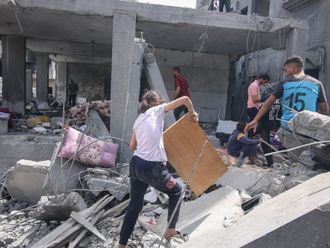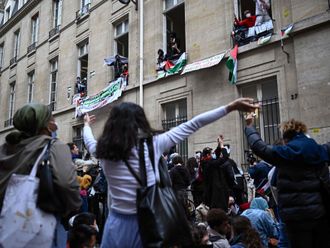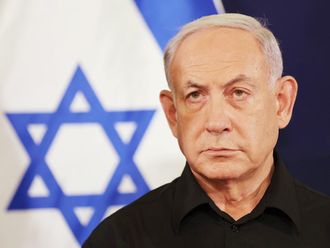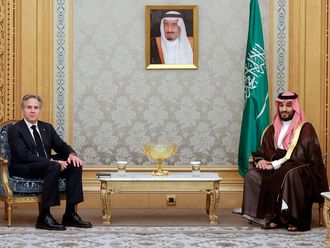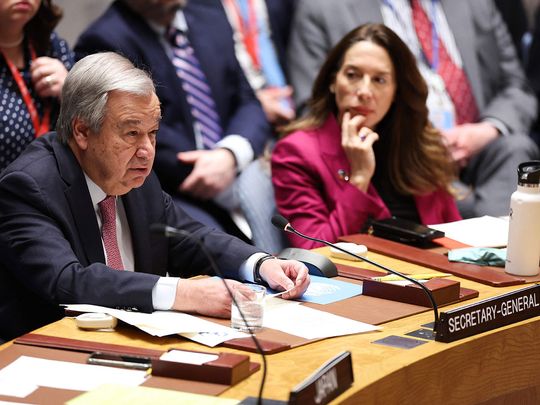
Abu Dhabi/Washington: The UAE and other Arab states Saudi Arabia, Bahrain, Kuwait, Oman, Egypt, Iraq, Jordan and Qatar, along with global powers Russia, China, France and Germany urged restraint after Iran warned Israel and the United States yesterday of a “much larger response” if there is any retaliation for its mass drone and missile attack on Israeli territory overnight, even as Israel said “the campaign is not over yet”.
Turkey also called on Iran to avoid a “new escalation”, while leaders of G7 nations condemned Iran’s unprecedented attack on Israel and called for “restraint” from all sides.
Earlier, in a statement released by the Ministry of Foreign Affairs (MoFA), the UAE called for exercising the utmost restraint in order to avoid serious repercussions, and the region being pulled into new levels of instability.
The Ministry called for resolving conflicts through dialogue and diplomatic channels, and for adhering to the rule of law and respecting the United Nations Charter. Furthermore, the Ministry called on the United Nations and the UN Security Council to fulfil their responsibilities to enhance international peace and security by resolving long-standing issues and conflicts in the region that threaten global security and stability.
Saudi, Iranian ministers discuss regional escalation
The Saudi and Iranian foreign ministers discussed the escalating tensions. The official Saudi Press Agency said Iran Foreign Minister Hossein Amirabdollahian initiated the call with Saudi Foreign Minister Prince Faisal bin Farhan.
During the call, they discussed the latest developments in the region and the increasing escalation against the backdrop of the crisis in the Gaza Strip and its repercussions.
Meanwhile, Prince Faisal bin Farhan arrived in the Uzbekistan capital Tashkent to attend the second ministerial meeting between Gulf Cooperation Council (GCC) countries and Central Asian states, scheduled for Monday. At Tashkent International Airport, the minister was received by the Uzbek Deputy Foreign Minister Bahram Aliyev
UN chief calls for maximum restraint
United Nations Secretary-General Antonio Guterres told member states that the UN charter bars the use of force against the territorial integrity or political independence of any state as he condemned Iran's attack on Israel and warned against further escalation.
"The Middle East is on the brink. The people of the region are confronting a real danger of a devastating full-scale conflict. Now is the time to defuse and de-escalate," Guterres told the meeting, which was called after Iran's attack.
Guterres on Sunday also called for an immediate humanitarian ceasefire in Gaza after more than six months of fighting, the unconditional release of all hostages and the unimpeded delivery of humanitarian aid to Gaza as it faces famine.
"Regional - and indeed global - peace and security are being undermined by the hour. Neither the region nor the world can afford more war," he said.
EU's Air Safety Agency recommends caution
The European Union Aviation Safety Agency said on Monday it keeps recommending caution in the airspaces of Iran and Israel and around 100 nautical miles surrounding Israel even though there was no overflight risk for civil aviation at any time.
EASA, as the agency is known, said in an emailed advisory it is closely monitoring the situation in the Middle East and its impact on civil aviation.
US tells Israel it won't join any retaliatory strikes
US President Joe Biden warned Benjamin Netanyahu the US will not take part in a counter-offensive against Iran, according to officials.
Deputy US Ambassador to the UN Robert Wood called on the council to unequivocally condemn Iran's attack.
"Let me be clear: if Iran or its proxies take actions against the United States or further action against Israel, Iran will be held responsible," he said.
Still, Biden told Netanyahu the US would not participate in any Israeli counter-offensive against Iran over the attack, a White House official said.
US State Antony Blinken and Defense Secretary Lloyd Austin also spoke to counterparts including in Saudi Arabia, Turkey, Egypt and Jordan, stressing the need to avoid escalation, the importance of a coordinated diplomatic response, and emphasizing the US will continue to support Israel's defense.
G7 'ready to take measures' over destabilisation
G7 leaders offered their full support for Israel, and said they were ready to "take further measures" in response to "further destabilising initiatives".
"We express our full solidarity and support to Israel and its people and reaffirm our commitment towards its security," they said, in the statement published by the Italian G7 presidency.
"With its actions, Iran has further stepped toward the destabilisation of the region and risks provoking an uncontrollable regional escalation. This must be avoided.
"We will continue to work to stabilise the situation and avoid further escalation.
"In this spirit, we demand that Iran and its proxies cease their attacks, and we stand ready to take further measures now and in response to further destabilising initiatives."
European Commission President Ursula von der Leyen said in a separate statement: "Going forward we will reflect on additional sanctions against Iran in close cooperation with our partners. Specifically on its drone and missile programmes."
The G7 - which groups the United States, Japan, Germany, France, Britain, Italy and Canada - also said Sunday they would step up efforts to end that crisis.
"We will also strengthen our cooperation to end the crisis in Gaza, including by continuing to work towards an immediate and sustainable ceasefire and the release of hostages by Hamas, and deliver increased humanitarian assistance to Palestinians in need," they said.
Israel urges 'all possible sanctions' against Iran
Israel's UN envoy, Gilad Erdan, urged the Council to "impose all possible sanctions on Iran before it's too late" and "condemn Iran for their terror".
G7 leaders earlier said they were ready to "take further measures" in response to "destabilising initiatives".
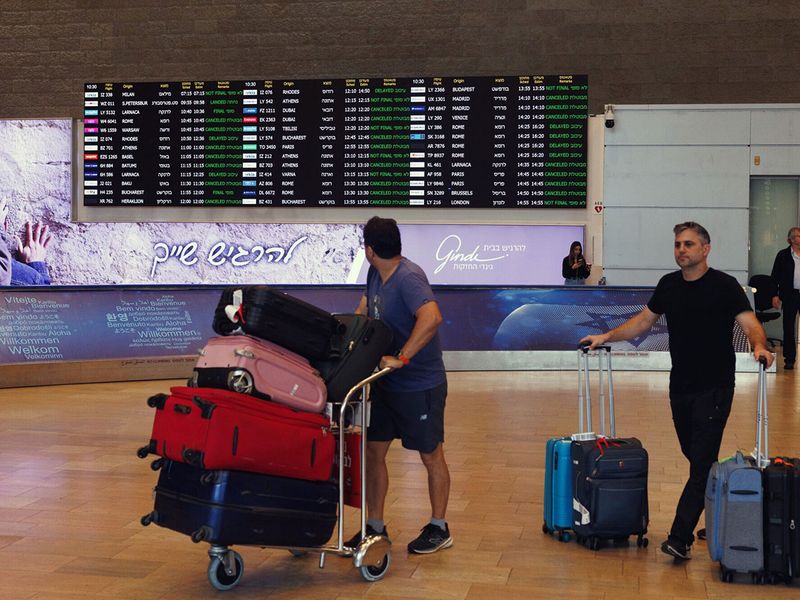
Flights get longer
A number of airlines are rerouting or avoiding trouble spots in a series of decisions that will prolong flight times and add to fuel costs. They include Qantas Airways Ltd., Singapore Airlines Ltd. and Deutsche Lufthansa AG.
Emirates, Etihad and Qatar Airways resumed some suspended Middle Eastern services on Sunday as airspaces reopened.
Earlier in Israel's war against Hamas in Gaza, airlines faced scores of disruptions primarily centered on Tel Aviv, cancelling flights into or out of the country.
Israel shut down its airspace for both domestic and international routes on Saturday, before reopening them Sunday morning. Lebanon and Iraq too resumed flights over their territories.
Days earlier, Lufthansa Group suspended flights to several cities in the Middle East. The group "- whose airlines include Germany's flag carrier Lufthansa, Austrian Airlines and Swiss International Air Lines "- said Sunday that it will resume flights to Tel Aviv, Erbil in Iraq and Amman on Tuesday, while those to Beirut and Tehran will continue to be halted until at least April 18.
Qantas had temporarily adjusted its direct Perth-London flights to stop over in Singapore to account for the extra fuel needed to re-route around the volatile region.
Singapore Air said that its flights were not overflying Iranian airspace. Cathay Pacific Ltd. is watching the situation in the Middle East closely, but its operations remain normal, a spokesman said in a text message Sunday.
Quest for peace
The threat of open warfare erupting between the arch Middle East foes and dragging in the United States has put the region on edge as Washington said America did not seek conflict with Iran but would not hesitate to protect its forces and Israel.
“We don’t want to see this escalate,” White House National Security Council spokesman John Kirby said on NBC’s “Meet the Press”. “We’re not looking for a wider war with Iran.”
Iran launched the attack over a suspected Israeli strike on its consulate in Syria on April 1 that killed top Revolutionary Guards commanders. However, the attack from hundreds of missiles and drones, mostly launched from inside Iran, caused only modest damage in Israel as most were shot down. An Air Force base in southern Israel was hit, but continued to operate as normal and a 7-year old child was seriously hurt by shrapnel. There were no other reports of serious damage.
Iranian Foreign Minister Amir Abdollahian said Tehran had informed the United States its attack on Israel would be “limited” and for self defence


